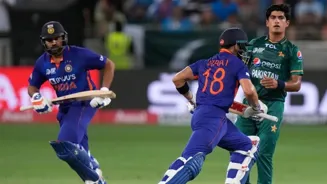The Asia Cup 2025 is set to take centre stage from September 9 as eight Asian nations fight for continental supremacy in the UAE.
This is the 17th edition
of Asia Cup, and among the participants, Sri Lanka is the only country who will take part in it for the 17th time. Even the cricketing powerhouses like India and Pakistan haven't participated in all of the editions.
The second Asia Cup, also known as the John Player Gold Leaf Trophy, was scheduled in Sri Lanka from March 30 to April 6, 1986. Following the success of the inaugural 1984 edition in Sharjah, where India won the title, expectations were high for a competitive follow-up. However, India, the defending champions, withdrew, leaving Sri Lanka, Pakistan, and debutant Bangladesh to contest.
Why did India boycott Asia Cup 1986?
Civil War in Sri Lanka
Sri Lanka was in the early, violent phase of its civil war (1983-2009) between the government and the Liberation Tigers of Tamil Eelam (LTTE). Incidents such as the Anuradhapura Massacre (May 1985), which killed 146 civilians, underscored the instability. The Indian government, wary of risking players' safety, refused to send the team to such an environment. This reflected broader caution, later seen in New Zealand canceling a 1987 Sri Lanka tour after a bombing.
Strained Cricketing Relations
India's 1985 tour of Sri Lanka ended contentiously. Controversial umpiring decisions reportedly favored the hosts, helping Sri Lanka to secure their first-ever Test series win against India. Feelings of resentment made an immediate return to Sri Lanka undesirable. Many Indian players were uneasy about travelling to a conflict zone, especially so soon after a bitter series. The government supported the players' sentiments, making the boycott almost inevitable.
How did it Impact the Asia Cup 1986?
India's absence reduced the tournament to three teams. After round robin matches, Pakistan and Sri Lanka advanced to the final. Bangladesh made their ODI debut, while hosts Sri Lanka won the title after beating Pakistan in the final - powered by Arjuna Ranatunga and Aravinda de Silva. Ranatunga was the highest scorer of the tournament with 110 runs while Pakistan's Abdul Quadir was the highest wicket-taker with 9 wickets to his name. Sri Lankan President J.R. Jayewardene declared a national holiday after the Lankans won the tournament on home soil.














